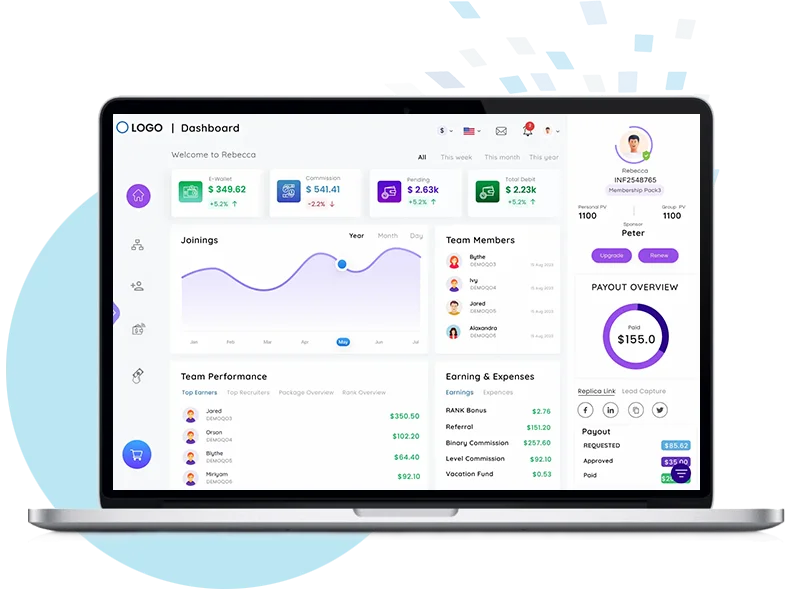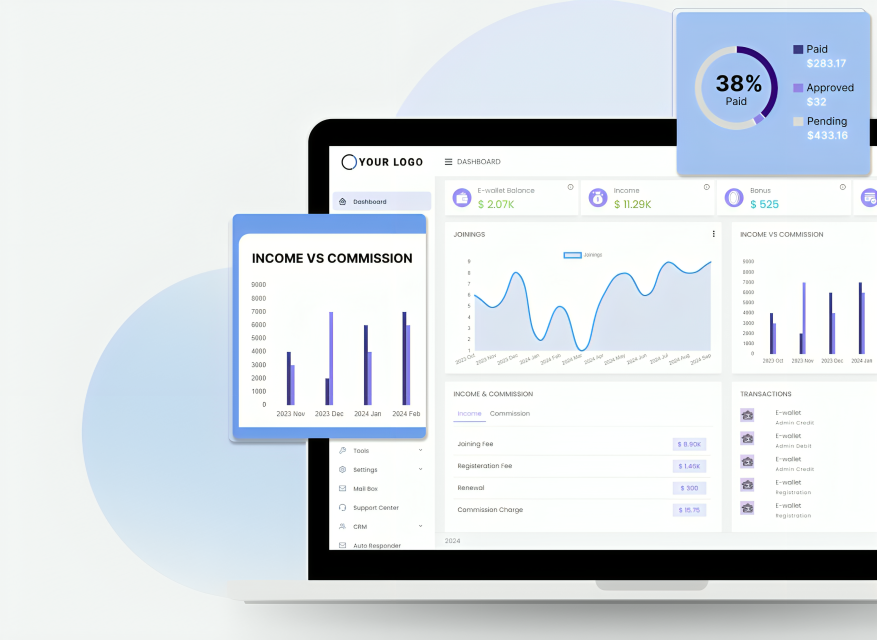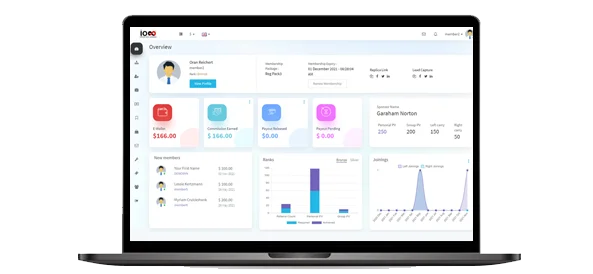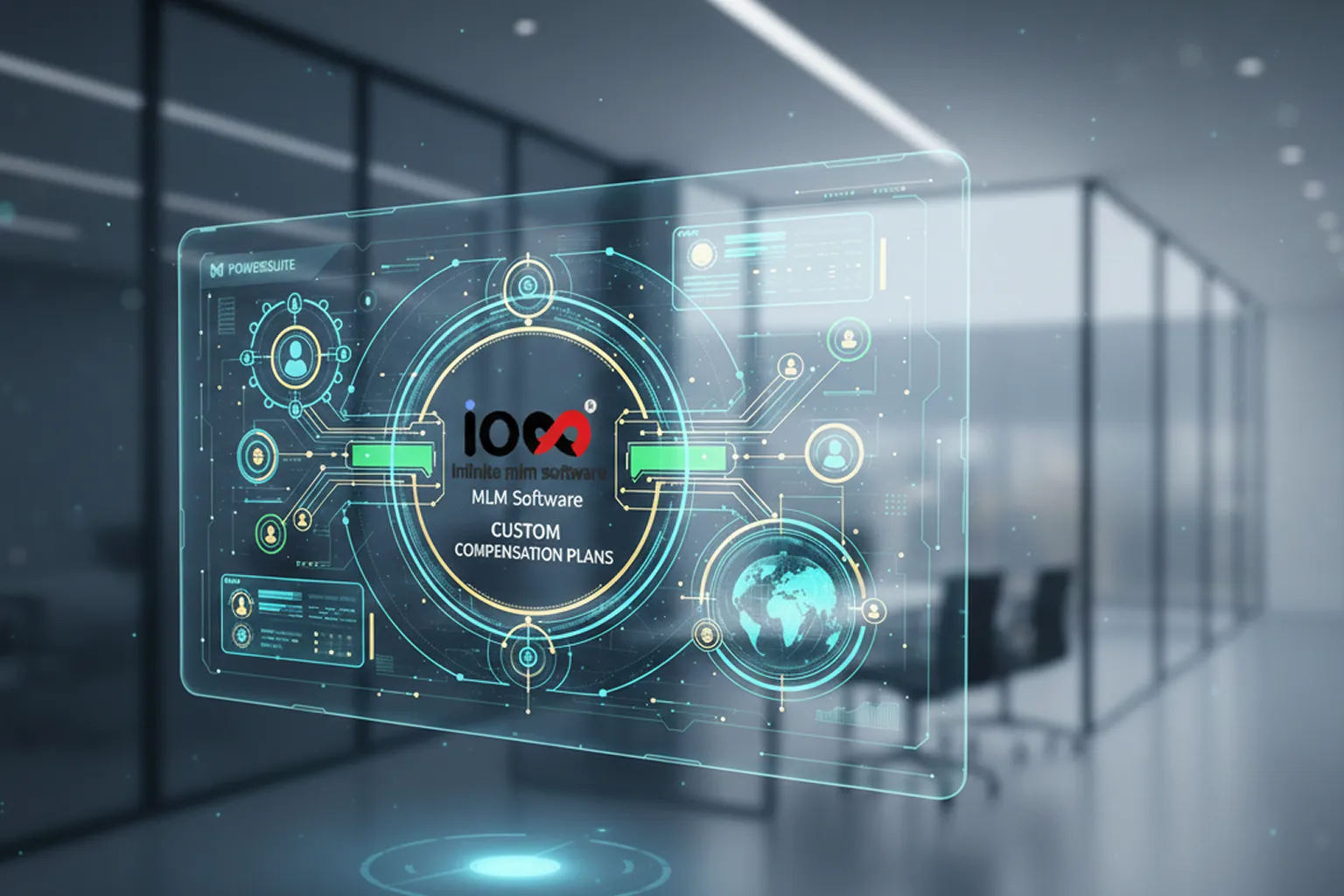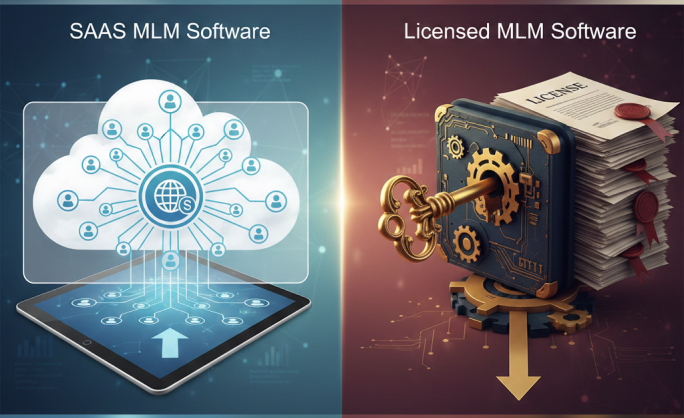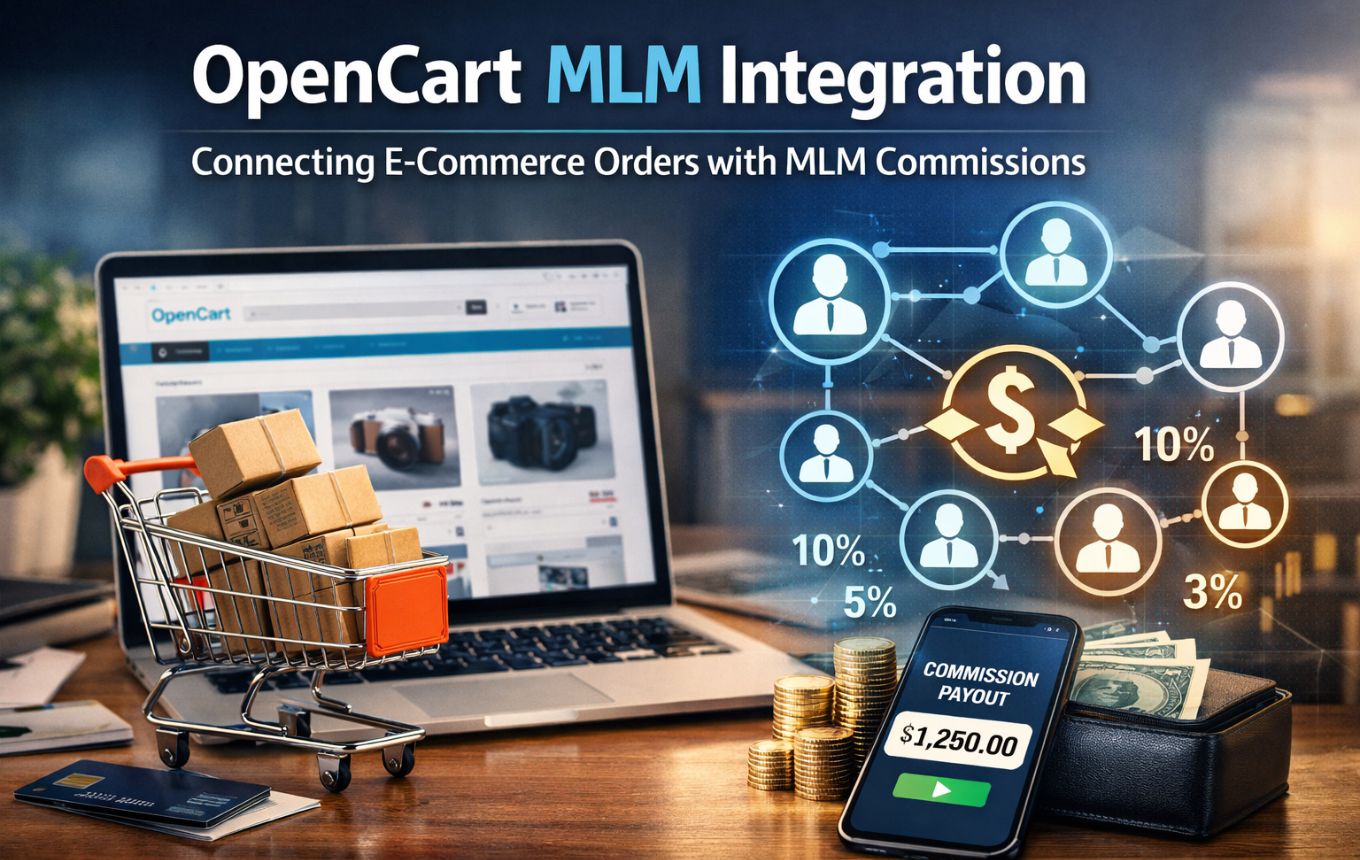Over 64% of MLM companies cite technical infrastructure as the top obstacle to scaling. In the fast-moving network market of 2025, where speed, flexibility, and automation drive distributor satisfaction, your MLM sales system can make or break growth.
So here’s the critical question:
Should you stick with an internal shopping cart built into your MLM software or expand using external e-commerce platforms like Shopify or WooCommerce?
This decision shapes everything from how well you track commissions and bonuses, to how fast new recruits can shop, and how seamless your customer experience feels. This guide offers a full breakdown to help you choose the path that aligns with your business goals, budget, and scalability needs.
What Is an Internal Shopping Cart in MLM Software?
An internal shopping cart is a built-in feature of MLM software that allows logged-in distributors or members to purchase products directly within the platform. Unlike external eCommerce integrations, this cart is aligned to the MLM system itself, meaning every transaction automatically connects with critical components like commission calculation, downline growth tracking, user access controls, and purchase workflows.
Access is exclusive to registered users, ensuring that every sale is correctly tied to a distributor’s account. This setup not only supports accurate commission distribution but also helps maintain a controlled purchasing environment. While it offers simplified functionality aligned to MLM operations, it may not have the advanced customization or marketing tools typically found in standalone e-commerce systems. However, for MLM businesses focused on operational control and distributor accountability, an internal shopping cart is a purpose-built and efficient solution.
Fully Integrated Within the MLM Software
The internal MLM cart is a native part of the MLM software, designed to support network-driven product sales.
No external plugins or hosting are required.
Product data, pricing, and eCommerce inventory system sync seamlessly with user profiles and roles.
It reduces the chance of data mismatches or platform dependency.
This design ensures stability, data security issues, and consistency across all operations, from order placement to commissions and bonuses.
Member-Only Access to a Controlled Buying Experience
Operating behind a login wall, the built-in MLM system is exclusively accessible to registered members.
Access can be restricted based on rank, region, or membership status.
Products, pricing, and promotional offers can be customized per user profile.
Sensitive or compliance-restricted items can be hidden from unauthorized users.
This private model reinforces exclusivity and strengthens user engagement.
Automated Commission Sync with Every Order
With the internal checkout model, orders are processed in real-time and immediately factored into the commission engine.
With the internal checkout model, orders are processed in real-time and immediately factored into the MLM commission software.
Sales volume (BV/CV), bonuses, and payout triggers are updated instantly.
No need for data exports or third-party syncing.
Genealogy trees and rank progression adjust dynamically with each purchase.
This automating MLM process improves accuracy and removes bottlenecks from the automated payouts cycle.
This automation improves accuracy and removes bottlenecks from the payout cycle.
Distributor-Friendly and Operationally Efficient
Internal carts are built for distributor ease-of-use.
Features like auto-ship, loyalty rewards, E-wallets, and reordering are integrated.
Users can manage orders, wallets, and shipping details in one dashboard.
Refunds and order changes automatically reflect in compensation reports.
This reduces admin overhead and enhances the distributor experience.
In conclusion, the internal shopping cart offers unmatched operational control, gamified elements, and real-time commission tracking, making it the ideal choice for MLM businesses focused on simplified efficiency and accurate MLM compensation plans.
What Are E-commerce Platforms and How Do They Work with MLM?
E-commerce platforms are public-facing digital storefronts that allow businesses to sell products directly to consumers. They’re widely used in traditional retail and increasingly adopted by MLM companies looking to grow retail reach, improve branding, or support hybrid selling models. However, since these platforms don’t come with MLM logic built-in, proper integration is necessary. Here’s how each major platform fits into MLM operations.
Shopify

Shopify is one of the most widely used hosted eCommerce platforms globally. It offers a clean, user-friendly interface with pre-built themes, mobile apps, and advanced app support. For MLM companies that want a fast, modern retail store especially for selling to non-members; Shopify offers a ready-made solution without requiring in-house infrastructure.
How It Works with MLM:
Shopify does not natively support MLM features like genealogy or tier-based commissions.
Businesses typically use Shopify MLM integration tools or middleware to sync order data, BV/CV values, and sponsor information with the MLM backend.
These tools ensure that each order is properly attributed to the referring distributor and reflected in the commission engine.
However, technical oversight and routine audits are needed to prevent missed entries or incorrect bonus calculations.
Challenges:
No built-in MLM logic; everything must be handled through external integrations.
Requires consistent validation to ensure accuracy in payouts and rank tracking.
WooCommerce

WooCommerce is an open-source e-commerce plugin built for WordPress. It’s favored by MLM businesses that prioritize customization, SEO-driven content, and complete control over design and user flow. WooCommerce is especially suitable for businesses with technical resources or developer access, offering flexibility in both storefront design and backend workflows.
How It Works with MLM:
WooCommerce itself doesn’t include MLM logic, but integration can be achieved using WooCommerce MLM plugins or custom APIs.
These plugins handle tasks like referral tracking, sponsor ID association, and volume syncing.
A properly mapped integration ensures accurate commission distribution and maintains downline data across systems.
Because WooCommerce is self-hosted, technical planning and regular audits are required to avoid syncing failures or commission gaps.
Challenges:
Needs server and plugin maintenance.
Errors in integration logic can lead to inconsistent payouts or broken referral chains.
Magento (Adobe Commerce)

Magento is a feature-rich, enterprise-grade platform used by global businesses with complex catalogs, multi-language support, and advanced product workflows. MLM companies operating across countries or managing large inventories often choose Magento integration for its scalability and backend control.
How It Works with MLM:
Magento doesn’t support MLM operations out of the box, but its advanced API capabilities make deep integration possible.
Custom APIs are used to sync orders, referral details, and BV/CV into the MLM software.
Many enterprise MLMs build proprietary modules to support rank-based pricing, volume thresholds, and commission rules.
However, these integrations require custom development, high upfront investment, and ongoing monitoring.
Challenges:
Complex setup and longer time-to-launch.
Requires dedicated tech teams to ensure accurate MLM sync.
BigCommerce

BigCommerce is a hosted platform like Shopify but comes with more built-in B2B features such as tiered pricing, bulk discounts, and real-time tax/shipping settings. It’s a strong choice for MLM businesses serving both retail and wholesale segments, and for those looking to support headless commerce (custom frontend + structured backend).
How It Works with MLM:
BigCommerce requires third-party connectors or custom API development to align with MLM systems.
These tools sync customer profiles, referral IDs, and transactional data into the MLM backend for proper commission distribution.
Advanced customer roles and price groups can mimic MLM behavior to some extent, but full downline logic still requires custom integration.
Consistent system validation and technical support are necessary to ensure orders trigger the correct bonuses and genealogy updates.
Challenges:
Lacks any built-in MLM functionality.
Requires close monitoring to avoid payout discrepancies.
How Do These Platforms Integrate with MLM Software?
While each e-commerce platform offers different features and flexibility, none of them natively support MLM business logic; such as multi-tiered commissions, genealogy, or dynamic member pricing. To make them work within an MLM ecosystem, businesses must rely on:
-
API Connectors or Middleware: Real-time syncing of order details, sponsor IDs, and BV into the MLM backend.
-
Custom Plugins: Available primarily for Shopify and WooCommerce to handle referrals and sales tracking.
-
Manual Importing: In low-volume cases, data may be exported and uploaded manually though this isn’t scalable.
Regardless of the method, technical planning, testing, and routine audits are essential to ensure accurate tracking of sales, rank progressions, and commissions.
Internal Shopping Cart vs. E-commerce Platforms: Key Differences
Choosing between an internal shopping cart and an external e-commerce platform depends on your business goals, technical capabilities, and target audience. Below is a side-by-side comparison highlighting the core differences between these two popular MLM selling tools.
| Feature | Internal Shopping Cart | E-commerce Platform |
|---|---|---|
| Access | Restricted to registered members; role and rank-based visibility | Public-facing storefront; open to general consumers |
| Commission Tracking | Native support for MLM compensation, volume tracking, and genealogy | Requires custom integration or third-party apps |
| Product Visibility Control | Fine-grained control over private/member-only products | Public by default; private product setup requires custom logic |
| Marketing Tools | Limited SEO, campaign, and tracking features | Advanced tools for SEO, ads, content, social sharing, and email marketing |
| Setup Cost | Lower; bundled with MLM systems | Higher; costs include platform fees, plugins, and custom development |
| Scalability | Scales within MLM networks; supports auto-ship and rank logic | Highly scalable through integrations, apps, and headless architecture |
| Customization | MLM-specific workflows pre-configured; limited flexibility | Fully customizable; requires adaptation to MLM needs |
| User Experience (UX) | Seamless for members; aligned with MLM onboarding and rewards | Designed for general retail UX; requires adjustment for MLM logic |
| Third-party Integration | Limited to MLM modules and core software tools | Wide compatibility with CRMs, payment gateways, analytics, shipping, etc. |
| Mobile Responsiveness | Basic mobile support; depends on MLM software UI | Optimized mobile design and responsive storefronts |
| Reporting & Analytics | Focused on MLM KPIs like volume, downlines, and earnings | advanced business intelligence tools for traffic, behavior, and sales data |
| Time to Launch | Faster to deploy if using bundled MLM software | May require extended setup and testing for MLM compatibility |
Optimizing User Experience: Internal Cart vs E-commerce Platforms in MLM
An internal shopping cart is designed only for registered members of an MLM platform. To use it, users must log in. Once inside, they can easily browse and buy products without leaving the system. This makes the shopping process smooth and keeps everything like purchases, offers, and account details linked to their member profile. It’s simple, easy to navigate, and helps members make quick and hassle-free purchases.
In comparison, e-commerce platforms are open to everyone. Anyone can visit, look through products, compare prices, and buy no need to register first. These platforms often include useful features like customer reviews, recommended products, and advanced search tools. They also have colorful, interactive designs that make shopping more enjoyable. This kind of experience works well for people who want more options and a fun, flexible way to shop.
How to Offer Public Products with Exclusive MLM Member Pricing Using These Platforms
Both internal carts and e-commerce setups can enable public stores with MLM discounts, allowing non-members to purchase at retail rates while providing exclusive pricing to members. In MLM systems, this is often native; members log in and automatically see their MLM member pricing based on rank, volume, or tier. The system can also dynamically update pricing tiers and apply benefits like loyalty points or replicated store tracking.
E-commerce platforms, however, handle this more elegantly through plugins or apps. Tools like “Wholesale Pricing” or “Customer Group Discounts” allow store owners to segment users and assign custom prices. This makes managing pricing tiers MLM simple and scalable. Platforms like Shopify or Magento also support layered discount rules, automated coupon generation, and smooth checkout UX across different customer types. For brands aiming to sell publicly while rewarding members behind the scenes, e-commerce platforms offer a more modular and extensible path for implementing MLM member pricing.
How to Choose Between an Internal Shopping Cart and an E-commerce Platform?
Choosing the right sales infrastructure is crucial for your MLM business. Your decision will affect everything from how customers interact with your products to how commissions are tracked and how your brand grows. Use the following guide to evaluate which option; internal shopping cart or e-commerce platform, best supports your strategy:
Budget
Internal carts are typically included within MLM software packages, offering built-in functionality like commission tracking, genealogy management, and role-based pricing, often with no additional monthly cost.
E-commerce platforms (like Shopify, WooCommerce, Magento) may involve higher upfront or monthly expenses, including plugin fees, custom development, and third-party tools for MLM compatibility.
Audience
If your business primarily serves registered members who shop based on rank, commission structures, or team lineage, an internal cart provides a closed, optimized experience.
If you plan to sell to the general public, or want to expand into retail sales, an e-commerce platform offers broader reach and a familiar shopping interface that appeals to non-members.
Technical Expertise
Internal MLM systems are often plug-and-play, with preconfigured logic customized for MLM compensation plans, dashboards, and distributor workflows.
E-commerce platforms require technical setup, including store configuration, theme customization, third-party plugin integration, and possibly developer support for MLM compatibility.
Marketing Goals
If your strategy involves SEO, digital ads, influencer marketing, or affiliate campaigns, e-commerce platforms are better equipped for visibility, content flexibility, and traffic acquisition.
If your focus is on incentive-driven member sales, rank advancement, and team-based promotion, internal carts align more naturally with MLM sales mechanics.
Scalability
E-commerce platforms offer advanced integration options for CRMs, email marketing, analytics, and shipping, making them ideal for rapid scale and cross-channel growth.
Internal carts scale within the MLM structure, supporting complex compensation plans, auto-ships, and volume calculations, without needing extensive MLM customization.
Whether your goal is simplified member management or public market expansion, this MLM tool comparison gives you a clear lens to evaluate your business needs. By aligning your budget, audience, and long-term goals, you can confidently select the best platform for MLM sales and make a well-informed MLM store decision that drives sustainable growth.
Pros and Cons
| Feature | Internal Shopping Cart | E-commerce Platform |
|---|---|---|
| Access | Member-only | Public |
| Commission Tracking | Built-in | Requires integration |
| Marketing | Limited | Advanced |
| Setup Cost | Lower | Higher |
| Scalability | Moderate | High |
Conclusion
What’s Right for YOUR MLM Business?
Choosing between an internal shopping cart and an e-commerce platform ultimately comes down to your business model. If your focus is on member-exclusive sales, commissions, and genealogy tracking, the internal cart offers a purpose-built environment with fewer technical demands.
On the other hand, if your MLM brand targets public audiences, retail sales, or SEO-driven growth, then e-commerce platforms like Shopify or WooCommerce provide better flexibility and visibility; with the tradeoff of needing more setup.
Before deciding, assess your goals, budget, and audience type. Are you optimizing for rank-driven member engagement or scaling visibility to the wider market? Either way, understanding your strategic priorities will help you invest in the right infrastructure for long-term success.
Frequently Asked Questions
An internal shopping cart is part of MLM software and is built specifically to support network marketing features, like rank-based pricing, commissions, and genealogy tracking. An e-commerce platform, like Shopify or WooCommerce, is designed for retail and offers broader marketing, SEO, and design capabilities but needs third-party tools or custom work to support MLM logic.
Yes. Many businesses adopt a hybrid MLM store model, using an internal cart for private/member-only purchases and an e-commerce platform for public-facing retail sales. This approach allows you to separate promotional strategies while maintaining backend visibility and tracking.
Both platforms can be secure when properly configured. Internal carts are usually hosted on secure MLM software servers with controlled access. E-commerce platforms rely on SSL encryption, PCI compliance, and third-party security plugins. The key is to ensure data privacy and transactional security in either setup.
Platforms like WooCommerce, Magento, and Shopify can integrate with MLM systems via custom APIs or third-party middleware. However, integration complexity varies. WooCommerce is often preferred due to its open-source flexibility.
In most cases, yes. You’ll likely need developer support to connect and sync your MLM backend with platforms like Shopify, especially if you’re tracking commissions, volumes, and replicated referrals. Pre-built plugins may cover some features, but complex logic often requires custom development.

